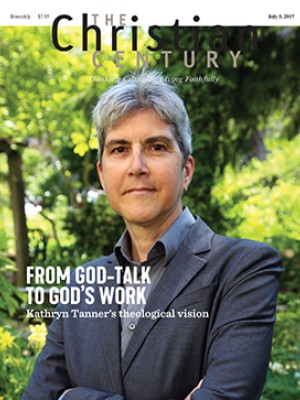God cares a lot about place—more than we do.
God marks places as sites of divine meeting, where divine touch surprises us, enfolding us in God’s own journey with us. Jacob journeys, and there between Beersheba and Haran he comes to the place of God.
Of course, he does not initially realize this. He is only looking for a place to rest. Yet there in Jacob’s dream state, the place reveals itself to him. It is a site where heaven touches earth and angels travel back and forth, coming here and returning there. There, at this intersecting place, God speaks to Jacob of his history and his destiny. When Jacob awakes from his dream state, he understands the place, marking it with a stone and anointing it with oil.
It is precisely this character of place that Christians have, for the most part, lost. It has never returned to us. Living as we do now, on the other side of colonialism and capitalism and nationalism, we function with a hollowed-out sense of place that has turned the earth into a series of commodified spaces, each with only whatever meaning and significance we superimpose on it. For too many of us, place is simply a projection of meaning onto spaces.
Read our latest issue or browse back issues.
If we want to understand the crisis of the earth at this moment, we need to look first not at how we have misused the earth and our fellow creatures but at how we have misperceived them. This misperception began in greed, as colonial Christian settlers looked out onto their new worlds with a sense of ownership born of misplaced claims to God’s sovereignty over the earth—and a freshly formed sense of responsibility to bring the new worlds and their peoples into the divine order.
These settlers formed the vision of private property that we now all know so well, one that ignores the history, character, sound, and soul of the land and its animals, choosing instead to see it all within a possessive logic. Private property means that the world no longer speaks. It is no longer communicative and animate, no longer the place where creature meets creature and shared Creator.
Too few of us know how to dream the land. Yet all over the world, indigenous peoples embody a different way of life, living in hope of places that speak in dreams and through which the divine also speaks.
But what of the Christian difference? Doesn’t Christianity mean a different orientation to place and space, one that frees us from our commitment to particular sites as holy places that must be defended with blood and violence? The problem is that this is a bad question, terribly put. It assumes that such ancient visions of place are, in a negative sense, primitive—and it describes the way many Christians actually think about place and presents this as the faith’s goal.
The story of our faith is the story of a God of place, not against place. From Israel’s story we learn of a God who placed the divine life between the land and the people, organizing Israel’s common life in the land to be a witness of God’s grace in that land, a grace that supplied their needs. God would always come between them and the land, guiding and directing their life with earth, sky, water, and animal.
We struggle with biblical accounts of Israel’s commanded violence in the land, but we cannot escape the truth that God claims the people and the land as God’s own. God’s claim reaches into the violence, encircling it, removing it as a power that Israel or any nation may claim as its own right, its own tool for the building of its kingdom. Violence is there in the land, but God is drawing it down, fencing it off from Israel. God draws the violence down—this is the truth of our faith’s story.
Ultimately violence finds its final local place in God’s own body. The cross is the end of violence in the land; raised on a cross from the earth is violence’s own end. Violence is no longer an option for God’s people who wish to live in the land and in the will of God. Only God can handle violence and in Jesus God has gathered up violence—its power, its seduction, and its belief working in us to convince us that it can make all things new. Only God can make all things new, and God has chosen to do so in the land and in places both special and mundane.
Place, then, is not evacuated of violence by turning it into nondescript, commodified, exchangeable spaces. Place is released from violence only when we hear God speaking to us in places, inviting us to dream of place at the intersection of heaven and earth—and calling us to life together in peace with those who are among us.
We need at this moment a new vision of land possession, one that is ancient, one that would teach us to say that the land possesses us before we possess the land. Such a way of rethinking possession does not begin with boundaries and borders, and certainly not with privatization and fragmentation. It begins with listening and responding, hearing and joining. We have been taught to see the earth as commodified, territorialized, nationally bounded spaces. In fact it exists as a whole space joined together by water, dirt, sky, animal, plant, and microbe.
The question for us is this: Could we allow our faith to teach us to dream the land again, to hear God calling us to a new depth of life together across the boundaries we have accepted, wrongly, as natural?






